(完整版)一般将来时
- 格式:doc
- 大小:53.51 KB
- 文档页数:9
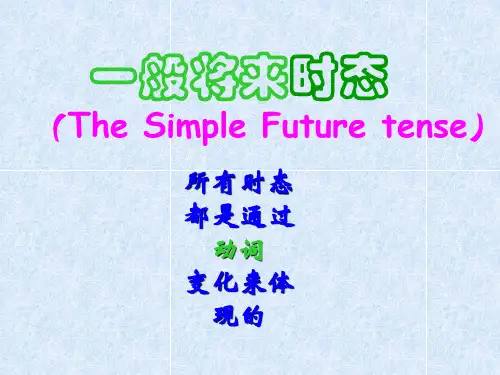
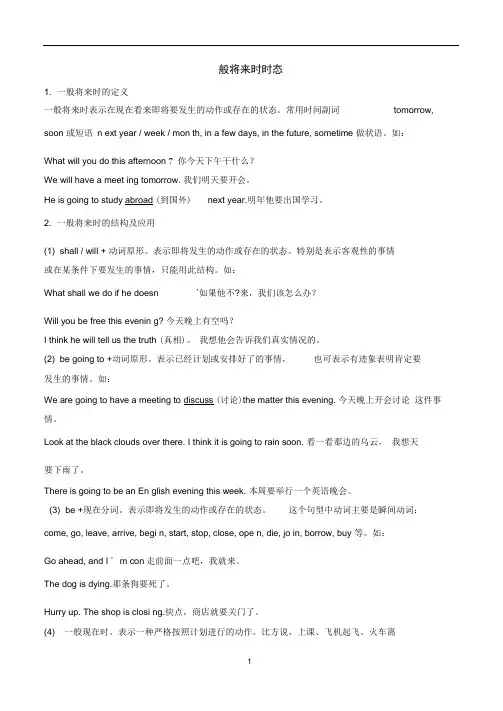
般将来时时态1. 一般将来时的定义一般将来时表示在现在看来即将要发生的动作或存在的状态。
常用时间副词tomorrow, soon 或短语n ext year / week / mon th, in a few days, in the future, sometime 做状语。
如:What will you do this afternoon ? 你今天下午干什么?We will have a meet ing tomorrow. 我们明天要开会。
He is going to study abroad (到国外) next year.明年他要出国学习。
2. 一般将来时的结构及应用(1) shall / will + 动词原形。
表示即将发生的动作或存在的状态。
特别是表示客观性的事情或在某条件下要发生的事情,只能用此结构。
如:What shall we do if he doesn '如果他不?来,我们该怎么办?Will you be free this evenin g? 今天晚上有空吗?I think he will tell us the truth (真相)。
我想他会告诉我们真实情况的。
(2) be going to +动词原形。
表示已经计划或安排好了的事情,也可表示有迹象表明肯定要发生的事情。
如:We are going to have a meeting to discuss (讨论)the matter this evening. 今天晚上开会讨论这件事情。
Look at the black clouds over there. I think it is going to rain soon. 看一看那边的乌云,我想天要下雨了。
There is going to be an En glish evening this week. 本周要举行一个英语晚会。
(3) be +现在分词。
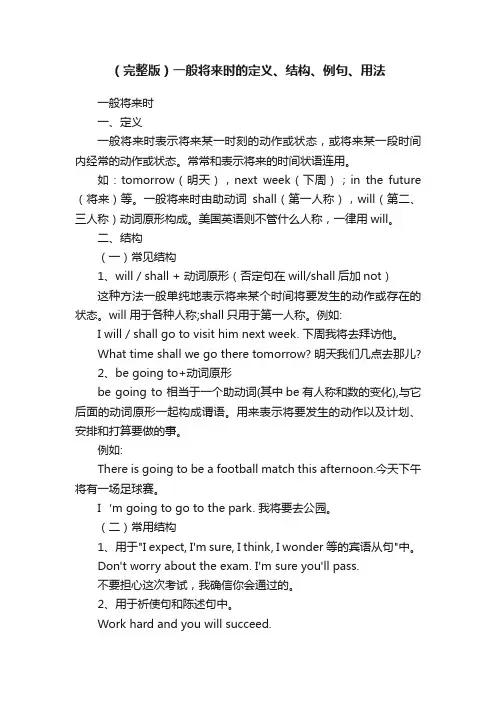
(完整版)一般将来时的定义、结构、例句、用法一般将来时一、定义一般将来时表示将来某一时刻的动作或状态,或将来某一段时间内经常的动作或状态。
常常和表示将来的时间状语连用。
如:tomorrow(明天),next week(下周);in the future (将来)等。
一般将来时由助动词shall(第一人称),will(第二、三人称)动词原形构成。
美国英语则不管什么人称,一律用will。
二、结构(一)常见结构1、will / shall + 动词原形(否定句在will/shall后加not)这种方法一般单纯地表示将来某个时间将要发生的动作或存在的状态。
will用于各种人称;shall只用于第一人称。
例如:I will / shall go to visit him next week. 下周我将去拜访他。
What time shall we go there tomorrow? 明天我们几点去那儿?2、be going to+动词原形be going to 相当于一个助动词(其中be有人称和数的变化),与它后面的动词原形一起构成谓语。
用来表示将要发生的动作以及计划、安排和打算要做的事。
例如:There is going to be a football match this afternoon.今天下午将有一场足球赛。
I‘m going to go to the park. 我将要去公园。
(二)常用结构1、用于"I expect, I'm sure, I think, I wonder等的宾语从句"中。
Don't worry about the exam. I'm sure you'll pass.不要担心这次考试,我确信你会通过的。
2、用于祈使句和陈述句中。
Work hard and you will succeed.如果你努力,就会成功的。
3、与表示时间或条件的状语从句连用。

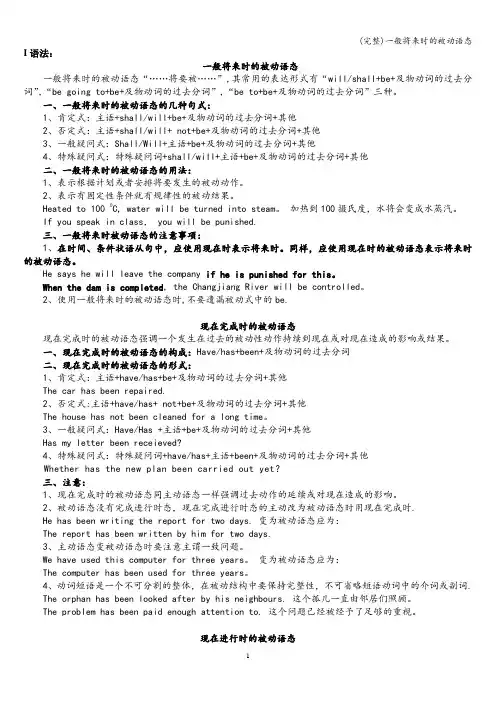
I语法:一般将来时的被动语态一般将来时的被动语态“……将要被……”,其常用的表达形式有“will/shall+be+及物动词的过去分词”,“be going to+be+及物动词的过去分词”,“be to+be+及物动词的过去分词”三种。
一、一般将来时的被动语态的几种句式:1、肯定式:主语+shall/will+be+及物动词的过去分词+其他2、否定式:主语+shall/will+ not+be+及物动词的过去分词+其他3、一般疑问式:Shall/Will+主语+be+及物动词的过去分词+其他4、特殊疑问式:特殊疑问词+shall/will+主语+be+及物动词的过去分词+其他二、一般将来时的被动语态的用法:1、表示根据计划或者安排将要发生的被动动作。
2、表示有固定性条件就有规律性的被动结果。
Heated to 100 0C, water will be turned into steam。
加热到100摄氏度,水将会变成水蒸汽。
If you speak in class, you will be punished.三、一般将来时被动语态的注意事项:1、在时间、条件状语从句中,应使用现在时表示将来时。
同样,应使用现在时的被动语态表示将来时的被动语态。
He says he will leave the company if he is punished for this。
When the dam is completed, the Changjiang River will be controlled。
2、使用一般将来时的被动语态时,不要遗漏被动式中的be.现在完成时的被动语态现在完成时的被动语态强调一个发生在过去的被动性动作持续到现在或对现在造成的影响或结果。
一、现在完成时的被动语态的构成:Have/has+been+及物动词的过去分词二、现在完成时的被动语态的形式:1、肯定式:主语+have/has+be+及物动词的过去分词+其他The car has been repaired.2、否定式:主语+have/has+ not+be+及物动词的过去分词+其他The house has not been cleaned for a long time。
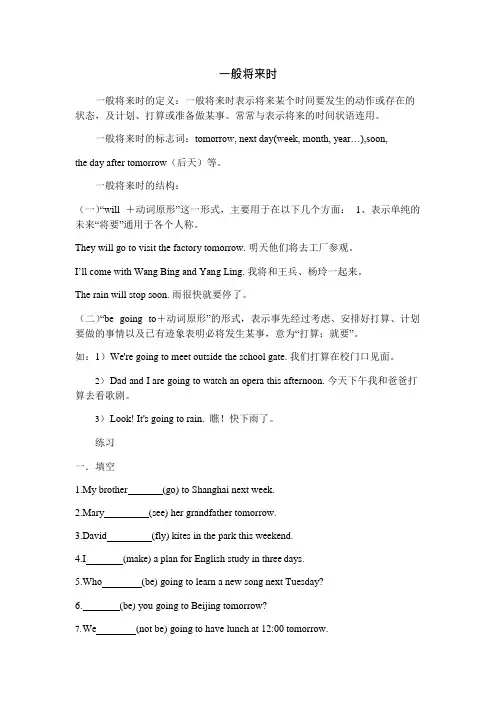


一般将来时(完整版) -CAL-FENGHAI-(2020YEAR-YICAI)_JINGBIAN一般将来时(完整版)一、单项选择一般将来时1.---I don’t know when _____ tomorrow.---I will call you as soon as he_____.A.will he come; arrives B.he will come; arrivesC.he will come; will arrive D.will he come; will come【答案】B【解析】考查时态。
第一句为when 引导的宾语从句,从句的时态,要根据时态本身来决定,第二句为if 引导的条件状语,主句为一般将来时,从句要用一般现在时,代替将来时,故选答案为B2.China's present environment situation is from bad to worse and if we _________ now to protect the environment, we’ll live to regret it.A.hadn’t acted B.haven’t acted C.don’t act D.won’t act【答案】C【解析】试题分析:句意:中国目前的环境状况越来越糟糕,如果我们现在不采取行动来保护环境,我们将会后悔。
if引导的条件状语从句,主句为一般将来时态,if从句用一般现在时态,选C。
考点:考查时态3. - Will you be available at three o'clock tomorrow afternoon?- No. I ______ a lecture then.A.are attending B.will have attended C.will attend D.will be attending 【答案】D【解析】试题分析:考查动词时态。
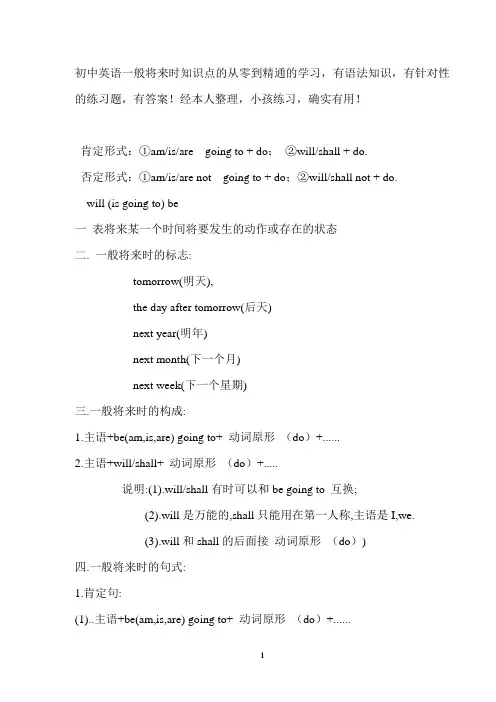
初中英语一般将来时知识点的从零到精通的学习,有语法知识,有针对性的练习题,有答案!经本人整理,小孩练习,确实有用!肯定形式:①am/is/are going to + do;②will/shall + do.否定形式:①am/is/are not going to + do;②will/shall not + do.will (is going to) be一表将来某一个时间将要发生的动作或存在的状态二. 一般将来时的标志:tomorrow(明天),the day after tomorrow(后天)next year(明年)next month(下一个月)next week(下一个星期)三.一般将来时的构成:1.主语+be(am,is,are) going to+ 动词原形(do)+......2.主语+will/shall+ 动词原形(do)+.....说明:(1).will/shall有时可以和be going to 互换;(2).will是万能的,shall只能用在第一人称,主语是I,we.(3).will和shall的后面接动词原形(do))四.一般将来时的句式:1.肯定句:(1)..主语+be(am,is,are) going to+ 动词原形(do)+......(2)..主语+will/shall+ 动词原形(do)+.....2.否定句:(1)..主语+be(am,is,are) not going to+ 动词原形(do)+......(2)..主语+will/shall not+ 动词原形(do)+.....3.一般疑问句:(1).Am/Is,Are+主语+going to+ 动词原形(do)+....(2).Will//shall+主语+ 动词原形(do)+...4.特殊疑问句:(1).What (Where, How...)+be (am,is,are)+主语+ going to + 动词原形(do)+...?(2). What (When,Where,How...) +will/shall+ 主语+ 动词原形(do)+...?二、基本结构:①be going to + do;②will+ do.三、否定句:在be动词(am, is, are)后加not或will后加not成won’t。
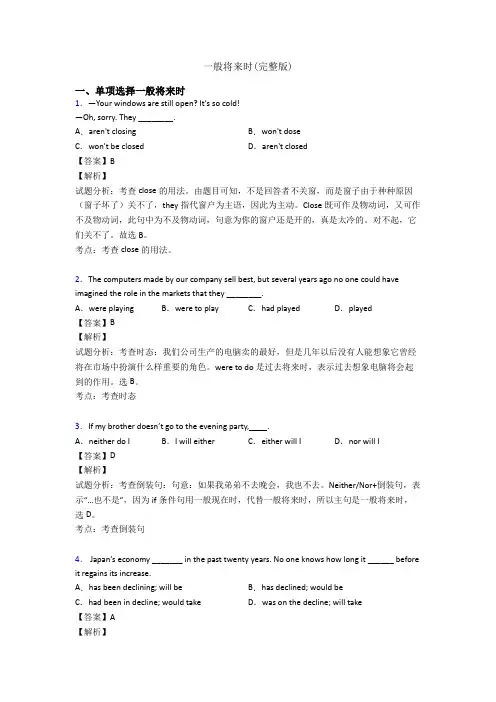
一般将来时(完整版)一、单项选择一般将来时1.—Your windows are still open? It's so cold!—Oh, sorry. They ________.A.aren't closing B.won't doseC.won't be closed D.aren't closed【答案】B【解析】试题分析:考查close的用法。
由题目可知,不是回答者不关窗,而是窗子由于种种原因(窗子坏了)关不了,they指代窗户为主语,因此为主动。
Close既可作及物动词,又可作不及物动词,此句中为不及物动词,句意为你的窗户还是开的,真是太冷的。
对不起,它们关不了。
故选B。
考点:考查close的用法。
2.The computers made by our company sell best, but several years ago no one could have imagined the role in the markets that they ________.A.were playing B.were to play C.had played D.played【答案】B【解析】试题分析:考查时态:我们公司生产的电脑卖的最好,但是几年以后没有人能想象它曾经将在市场中扮演什么样重要的角色。
were to do是过去将来时,表示过去想象电脑将会起到的作用。
选B。
考点:考查时态3.If my brother doesn’t go to the evening party, .A.neither do I B.I will either C.either will I D.nor will I【答案】D【解析】试题分析:考查倒装句:句意:如果我弟弟不去晚会,我也不去。
Neither/Nor+倒装句,表示“…也不是”,因为if条件句用一般现在时,代替一般将来时,所以主句是一般将来时,选D。
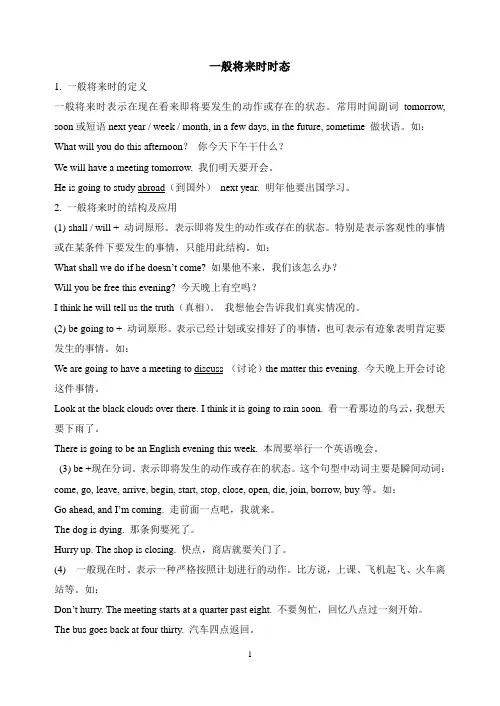
一般将来时时态1. 一般将来时的定义一般将来时表示在现在看来即将要发生的动作或存在的状态。
常用时间副词tomorrow, soon或短语next year / week / month, in a few days, in the future, sometime 做状语。
如:What will you do this afternoon?你今天下午干什么?We will have a meeting tomorrow. 我们明天要开会。
He is going to study abroad(到国外)next year. 明年他要出国学习。
2. 一般将来时的结构及应用(1) shall / will + 动词原形。
表示即将发生的动作或存在的状态。
特别是表示客观性的事情或在某条件下要发生的事情,只能用此结构。
如:What shall we do if he doesn’t come? 如果他不来,我们该怎么办?Will you be free this evening? 今天晚上有空吗?I think he will tell us the truth(真相)。
我想他会告诉我们真实情况的。
(2) be going to + 动词原形。
表示已经计划或安排好了的事情,也可表示有迹象表明肯定要发生的事情。
如:We are going to have a meeting to discuss (讨论)the matter this evening. 今天晚上开会讨论这件事情。
Look at the black clouds over there. I think it is going to rain soon. 看一看那边的乌云,我想天要下雨了。
There is going to be an English evening this week. 本周要举行一个英语晚会。
(3) be +现在分词。
表示即将发生的动作或存在的状态。
一般将来时一.定义:一般将来时表示将来某个时间要发生的动作或存在的状态,常与一般将来时连用的时间状语有:二、结构肯定句:①主语+ will / shall +动词(原形)+其他…I will buy some books tomorrow.②主语+ be going to + 动词(原形)+其他…否定句:①主语+ will / shall +not +动词(原形)+其他…I will not buy some books tomorrow.②主语+ be +not+ going to + 动词(原形)+其他…I am not going to buy some books tomorrow.疑问句:Will / Shall +主语+动词原形+其他…?Will you buy some books tomorrow?Be +主语+going to + 动词原形+其他…?Are you going to buy some books tomorrow?回答方式:肯定回答:① Yes,主语+will ② Yes,主语+ be否定回答:① No,主语+will +not ② No, 主语+be + not特殊疑问句:特殊疑问词+shall /will+主语+动词原型+其他…Where will you go next week? 下星期你去哪?What shall I do?我怎么办呢?How many books will they get? 他们将有多少本书?三区别.will, be going to …, be to…(高中), be about to(初中)…1.be going to +不定式,表示将来。
表示打算、准备做的事或即将发生或肯定要发生的事。
be going to和will相比,be going to通常表示主观,will通常表示客观。
What are you going to do tomorrow? 明天你要做什么?Look at the dark clouds, there is going to be a storm. 看看这些黑云,将有一场暴风雨。
一般将来时讲解(附习题+答案)一、一般将来时的含义:表示动作发生在将来二、一般将来时的句型:(1) will/shall+动词原形(2) be going to+动词原形三、一般将来时的时间状语:tomorrow(明天)、the day after tomorrow(后天)、next...(下一...): next week(下一周)、next year(明年)、next month(下个月)in+一段时间(...之后): in three days(三天之后)、in the future在未来this evening(今天晚上)四、一般将来时的句型结构:(1) will/shall+动词原形(will not =won’t)(will 各种人称均可用,shall 只能用于第一人称)1)肯定句:主语+will/shall+动词原型...如:I will go to school tomorrow.我明天将会去学校He will go to school tomorrow.他明天将会去学校。
2)否定句:主语+will/shall+not+动词原型...如:I won’t go to school tomorrow.我明天将不会去学校。
He won’t go to school tomorrow.他明天将不会去学校。
3)一般疑问句:Will/Shall +主语+动词原型...如:Will you go to school tomorrow?你明天要去学校吗?Will he go to school tomorrow?他明天要去学校吗?肯定回答:Yes, 主语+will.如:Yes, I will.Yes, he will.否定回答:No,主语+will+not.如:No, I won’t.No, he won’t.4) 特殊疑问句:特殊疑问词+will/shall+主语+动词原型...如:What will you do tomorrow?你明天将会做什么?What will he do tomorrow?他明天将会做什么?(2) be going to+动词原形1)肯定句:主语+be going to +动词原型...如:I am going to buy some books tomorrow.我明天打算去买一些书。
一.一般将来时:表示将来某个时间(相对于讲话时间)将要发生或存在的状态,也表示将来的一段时间内经常或反复发生的动作,常与表示将来的时间连用,如下:tomorrow明天the next time下一次the day after tomorrow后天next week下周next year明年tomorrow evening明天晚上in the future将来later(on)以后before long不久后其基本句型如下:(一)will:will+动词原形,可以用于第一,第二,第三人称及其复数(不分人称)。
<1>陈述句肯定句:主语+ will + 动词原形(+将来的时间或地点).否定句:主语+ won’t + 动词原形(+将来的时间或地点)例句:I will play the piano at the concert.我将要在音乐会上弹钢琴。
I won’t go to school tomorrow.我明天不上学。
<2>特殊疑问句特殊疑问词+will+人称+动原+将来的时间?答句:人称+will+动词原形.例句:What will you be in the year 2050? 2050年你将会成为什么?I will be a doctor.我将会成为一个医生。
<3>一般疑问句Will+人称+动词原形(+将来的时间或地点)?答句:Yes,人称+will. No,人称+won’t.例句:Will you visit your grandparents this Saturday? 这周六你是否去拜访你的爷爷奶奶?Yes, I will.(二)shall:shall+动词原形,只能用于第一人称的单复数(I, we)<1>陈述句肯定句:I/We shall + 动词原形(+将来的时间或地点)。
我/我们将要…否定句:I/We shall not + 动词原形(+将来的时间或地点)。
我/我们将不会…<2>特殊疑问句:特殊疑问词+ shall + 人称+ 动词原形(+将来的时间)?答语:I/We shall + 动词原形例如:What shall we do?我们该怎么办?Where shall I go?我该去哪呢?<3>一般疑问句Shall I / we + 动词原形(+将来的时间或地点)?答语:Yes, I / we shall. No, I / we shall not.例句:Shall I/ we go to school tomorrow? 我/我们明天将要上学吗?Yes, we shall. No, we shall not.(三)be going to结构,根据人称及单复数变换系动词be的形式(am, is, are)。
*(1)be going to +动词原形,表示将来要做某事或发生某事。
(2)be going to + 地点,表示将要去某地(3)be going there/here.将要去那里/这里一、单项选择。
1. There __________ a meeting tomorrow afternoon.A. will be going toB. will going to beC. is going to beD. will go to be2. Charlie ________ here next month.A. isnt workingB. doesnt workingC. isnt going to workingD. wont work3. He ______ very busy this week, he ________ free next week.A. will be; isB. is; isC. will be; will beD. is; will be4. There ______ a dolphin show in the zoo tomorrow evening.A. wasB. is going to haveC. will haveD. is going to be5. –________ you ________ free tomorrow?–No. I ________ free the day after tomorrow.A. Are; going to; willB. Are; going to be; willC. Are; going to; will beD. Are; going to be; will be6. Mother ________ me a nice present on my next birthday.A. will givesB. will giveC. givesD. give7. –Shall I buy a cup of tea for you?–________.A. No, you wont.B. No, you arent.C. No, please dont.D. No, please.8. –Where is the morning paper?–I ________ if for you at once.A. getB. am gettingC. to getD. will get9. ________ a concert next Saturday?A. There will beB. Will there beC. There can beD. There are10. If they come, we ________ a meeting.A. haveB. will haveC. hadD. would have11. He ________ her a beautiful hat on her next birthday.A. givesB. gaveC. will givingD. is going to giving12. He ________ to us as soon as he gets there.A. writesB. has writtenC. will writeD. wrote13. He ________ in three days.A. coming backB. came backC. will come backD. is going to coming back14. If it ________ tomorrow, well go roller-skating.A. isnt rainB. wont rainC. doesnt rainD. doesnt fine15. –Will his parents go to see the Beijing opera tomorrow?–No, ________ .A. they willnt.B. they wont.C. they arent.D. they dont.16. Who _____ we ______ swimming with tomorrow afternoon?A. will; goB. do; goC. will; goingD. shall; go17. We ________ the work this way next time.A. doB. will doC. going to doD. will doing18. Tomorrow he ________ a kite in the open air first, and then ________ boating in the park.A. will fly; will goB. will fly; goesC. is going to fly; will goesD. flies; will go19. The day after tomorrow they ________ a volleyball match.A. will watchingB. watchesC. is watchingD. is going to watch20. There ________ a birthday party this Sunday.A. shall beB. will beC. shall going to beD. will going to be21. They ________ an English evening next Sunday.A. are havingB. are going to haveC. will havingD. is going to have22. ________ you ________ free next Sunday?A. Will; areB. Will; beC. Do; beD. Are; be23. He ________ there at ten tomorrow morning.A. willB. isC. will beD. be24. ______your brother ______ a magazine from the library?A. Are; going to borrowB. Is; going to borrowC. Will; borrowsD. Are; going to borrows25. –Shall I come again tomorrow afternoon?–________ .A. Yes, pleaseB. Yes, you will.C. No, please.D. No, you wont.26. It ________ the year of the horse next year.A. is going to beB. is going toC. will beD. will is27. ________ open the window?A. Will you pleaseB. Please will youC. You pleaseD. Do you28. –Lets go out to play football, shall we?–OK. I ________.A. will comingB. be going to comeC. comeD. am coming29. It ________ us a long time to learn English well.A. takesB. will takeC. spendsD. will spend30. The train ________ at 11.A. going to arriveB. will be arriveC. is going toD. is arriving改句子。